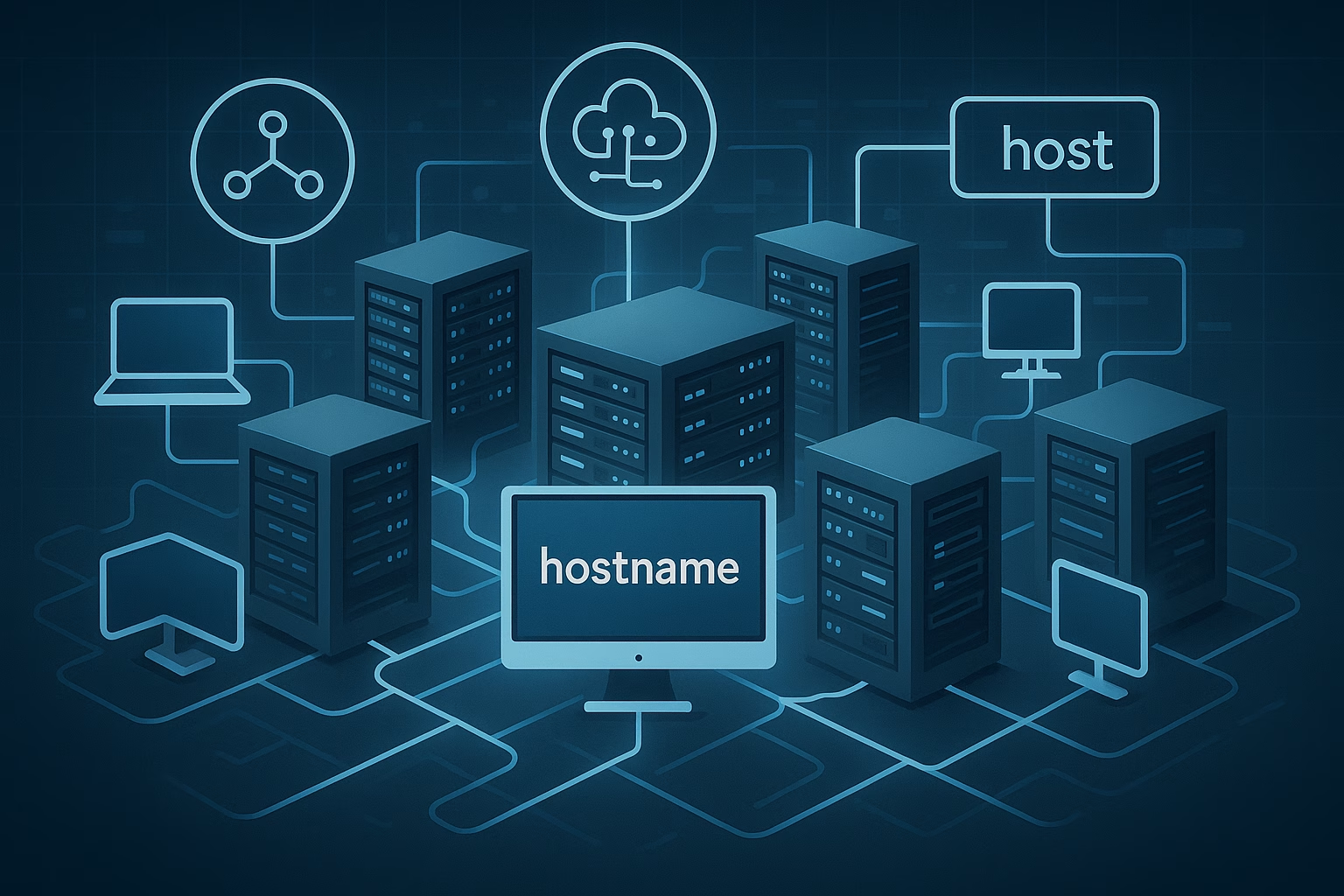
Introduction
In 2025, terms related to networks and servers are still essential to understanding how digital systems work. One of the most fundamental yet often misunderstood concepts is the hostname.
Imagine you are in a city where every building has a unique name: "Penguin House", "Awake Router Tower", "Apache Server Castle". In that city, no one gets lost, because everyone knows exactly where to go. That's what makes a hostname in a network.
If you have ever set up a server, a network or even a domain, you have probably heard of it, but do you really know what it is and why it is important?
In 2025, the digital infrastructure is more alive than ever. And for it to function properly, every device - from your smart fridge to the server that hosts your online store - needs a unique name to identify it: its hostname. But don't worry, we're not going to give you a boring networking lesson. We're going to tell it to you as if you had to name your digital pets.
Table of Contents
What is a Hostname?
A hostname is the unique name assigned to a device within a network to identify it. This name makes it easier for devices on a network to communicate with each other. Although, in essence, all devices are connected through IP addresses, the hostname is much easier for humans to remember and use.
Think of it this way: if your computer were a dragon, its hostname would be like the magic name you use to summon it.
How is a Hostname used in networks?
In computer networks, the hostname allows devices to be uniquely identified. Each device within a network, whether it is a server, computer or router, has a hostname that distinguishes it from the others.
In addition, the hostname facilitates the conversion of human-readable addresses (such as www.ejemplo.com) to IP addresses, thanks to the Domain Name System (DNS).
As if you asked Google Maps where "Grandma's house" is and it gave you the exact coordinates.
Hostname on servers and domains:
Hostnames play a crucial role in web server administration. A hostname, such as server1.example.comidentifies a specific server within a company's infrastructure.
In terms of web domains, although hostnames and domains are often spoken of as if they were interchangeable, they are not the same thing. A hostname is the name of the device (for example, www.ejemplo.com), while a domain is the registered name associated with that device.
The hostname is not the domain itself, but it is the title of one of the key characters in the story.
The importance of the Hostname in the Domain Name System (DNS):
When a user types a URL into their browser, the DNS system translates the hostname into an IP address, allowing the browser to connect to the correct server. Without a proper hostname, users will not be able to access your website.
How to configure a Hostname in 2025?
Assigning a hostname may vary depending on the operating system. Here is a guide for the most common systems:
-
On Linuxyou can set up a hostname by modifying the file /etc/hostname and then rebooting the system.
-
In WindowsThe hostname can be changed from the system properties.
Be sure to follow good practices for choosing a hostname that is descriptive, easy to remember, and compatible with the DNS system.
Surrealistic advice: Don't use names like "localhost" or "test123" if you don't want your dragon to get confused in a server battle.
Difference between Hostname, Domain Name and FQDN (Fully Qualified Domain Name):
-
Hostname: The unique name assigned to a device on a network, such as server1.example.com.
-
Domain Name: It is the name of your website registered in a TLD, such as example.com.
-
FQDNFQDN: An FQDN is the full domain name, which includes both the hostname and the domain (e.g., "FQDN"), server1.example.com).
Common mistakes when configuring a Hostname and how to avoid them:
Sometimes mistakes are made in the hostname configuration, such as using characters that are not allowed or not assigning a unique name. Be sure to check the settings on your server and network, and verify that the hostname is accessible and correctly configured.
-
Use spaces:
My Pro Server→ It's not a rock band name. -
Too generic:
pc01,server→ There are already millions - be creative! -
Forgetting to reboot the system: You named your dragon but you didn't wake it up.
Do you need help with your server or domain configuration? ClickPanda offers full support for server, domain and network management, contact us today and get personalized assistance to configure your network infrastructure!
Configure your server with ClickPanda
The relationship between Hostname and Network Security:
The hostname also plays an important role in network security. A well-configured hostname can help mitigate risks associated with unauthorized access or misuse of resources.
-
Authentication and securitySome operating systems or networks use the hostname to authenticate devices. If an incorrect hostname is configured or changed without updating the security settings, you may allow unauthorized devices to gain access.
-
SSL CertificatesIn the context of websites, a hostname is crucial for the implementation of SSL/TLS certificates. An SSL certificate is issued for a specific domain or hostname, ensuring that connections between users and the server are secure. If the hostname does not match the SSL certificate, users will receive a security error when trying to access the site.
Conclusion:
The hostname is an essential concept in networking and servers, and understanding how it works allows you to better manage your web infrastructure. From identifying devices within a network to configuring servers and domains, the hostname plays a fundamental role in digital communication. From waking up your server to your app responding to a user, it all starts with a well-chosen name. Don't underestimate the power of a good hostname - it's time to name your network as if you were the author of a science fiction novel!








